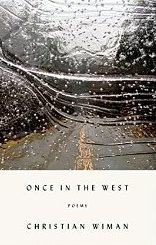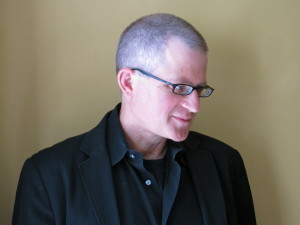Christian Wiman is an essayist, translator, and poet. For ten years (2003-2013), he was the editor of Poetry Magazine. He’s published four collections of poetry; the celebrated My Bright Abyss: Meditation of a Modern Believer; the equally celebrated Ambition and Survival: Becoming a Poet; and a translation of Osip Mandelstom’s poetry, Stolen Air. And with Don Share, he co-edited the Open Door: One Hundred Poems, One Hundred Years of Poetry Magazine.

Wiman grew up in West Texas, and the poems of Once in the West find their source in the upbringing and that geography. And it is characteristic Wiman to discover there is no poem with the title of “Once in the West.” Instead, the line is repeated in a number of poems in the book, suggesting that the idea of “Once in the West” is not a one-time event but rather an experience, one that keeps recurring throughout a life.
These are poems in which every words matters, every word crafted and carefully honed (including a few rather blue ones; Wiman knows how to use words, even vulgar ones). The words and the lines are as spare as the West Texas landscape, but spare does not mean bleak. The geography of West Texas is filled with beauty, but you have to look beyond what’s immediately apparent.
This is one of my favorite poems from Once in the West (and I have several).

Love’s last urgency is earth
and grief is all gravity
and the long fall always
back to earliest hours
that exist nowhere
but in one’s brain.
From the hard-packed
pile of old-mown grass,
from boredom, from pain,
a boy’s random slash
unlocks a dark ardor
of angry bees
that link the trees
and block his way home.
I like to hold him, holding me,
mystery mastering fear,
so young, standing unstung
under what survives of sky.
I learned too late how to live.
Child, teach me how to die.
It’s a poem filled with the man looking back to the boy, to the boy of memory, selecting a vivid remembrance and projecting forward into the regret of the adult. “I like to hold him, holding me, / mystery mastering fear” stands as a beautiful summary of the poem, and just possibly a life.
The poems of Once in the West grab hold and don’t let go.
We’ve been discussing the poetry collections nominated for the National Book Critics Circle Award. Last week, we covered Jake Adam York’s Abide; next week we’ll consider two of the nominees, Prelude to Bruise by Saeed Jones and The Essential Hits of Shorty Bon Bon. The following week, we’ll discuss the fifth of the five nominees, Citizen: An American Lyric by Claudia Rankine.
Related: My reviews of My Bright Abyss and Every Riven Thing.
Photo by MarcoMonetti, Creative Commons, via Flickr. Post by Glynn Young, author of the novels Dancing Priest and A Light Shining, and Poetry at Work.
Want to brighten your morning coffee?
Subscribe to Every Day Poems and find some beauty in your inbox.
- Poets and Poems: Luci Shaw and “An Incremental Life” - April 3, 2025
- Ben Palpant Talks with 17 Poets About, Well, Poetry - April 1, 2025
- Poets and Poems: Forrest Gander and “Mojave Ghost” - March 27, 2025

Kelly Chripczuk says
Reading My Bright Abyss right now and ordering it on Amazon so I don’t succumb to the temptation to underline and dog-ear the library copy. Good stuff, both deep and wide.
Megan Willome says
My dad, a West Texas boy, recommended this to me. Thanks for the reminder, Glynn.
Jerry says
Got three of his books. I almost heard him read in Grand Rapids MI but he had to cancel due to illness. Bright Abyss was a tasty meal of thought.
Sandra Heska King says
So… are you a “new” Jerry or a “regular?” At any rate, it’s cold enough in GR that you need a cup of hot tea and a slice of pie… over here… by the Mischief Cafe fireplace. 🙂